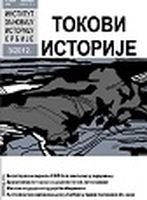Милош Mосковљевић о вођству Савеза земљорадника 1929–1941. Први део: време шестојануарске диктатуре 1929–1934.
Miloš Moskovljević: on the Leadership of the Peasant Alliance 1929–1941. first part: During the 6 thJanuary Dictatorship 1929–1934
Author(s): Momčilo IsićSubject(s): History
Published by: Institut za noviju istoriju Srbije
Keywords: Peasent Allience; Miloš Moskovljević; 6th January Dictatorship,; Jovan Jovanović Pižon; Milan Gavrilović
Summary/Abstract: Contrary to other political parties, banned during the 6th January Dictatorship, the leadership of the Peasant Alliance Party, met almost regularly but as the management of the trade association Village(Prometno drustvo Selo) whose work was not banned but was monitored. „Freed“ from doing propaganda work in the villages the leadership more often than before began endorsing their personal interests in the political discussions which dealt with: participation in the parliamentary elections in November 1931, discussions on the constitution, territorial division of the country into banovine, transformation of the state, agreement with the Croats, link between collective farming and the Peasant Alliance Party, the de/registering of the party. During this period the split in the leadership crystallized into supporters of left and right political options although there were those who like Miloš Moskovljević managed to stay neutral and objectively assess the activities of both sides. On one hand, there were people who because of their personal interest saw the main goal of the party to be joining the government or be close to it like the ten members of parliament elected at the November 1931 elections, Dimitrije Vujić who became a minister in the government of Bogoljub Jeftić and Voja Đordjević who delivered the independent collective farming movement to the regime. Miloš Moskovljević outlined the character of most of the party leaders in his diary entries, especially important being his perception of two of the first party leaders: Joca Jovanović-Pižon and Milan Gavrilović. On the basis of these entries we can explain their actions or lack of them at some vital moments and also confirm with greater certainty Mihajlo Avramović’s thesis that both of them were king’s men „infiltrated into the party“.
Journal: ТОКОВИ ИСТОРИЈЕ
- Issue Year: 2013
- Issue No: 2
- Page Range: 11-51
- Page Count: 41
- Language: Serbian

